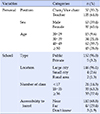Abstract
Purpose
This study was conducted to identify the perceptions toward school forest programs related to forest welfare services in elementary schools and suggest strategies to activate new programs.
Methods
A mixed method research was performed. Four teachers and one forest therapist participated in a focus group interview; 162 teachers answered a survey.
Results
The teachers were aware of the effects of the forest program, but there were some barriers, including the question of whether there was an accessible forest, school forest management problems, the risk of teachers' work overload, and the lack of program diversification for elementary students. Solutions included the expansion of school forests and forest facilities available to students, development of a variety of programs, provision of appropriate information on available facilities, and cooperation with educational institutions for institutionalization and increased effectiveness of school-based forest utilization programs. In addition, a scientific basis for data accumulation is needed.
Conclusion
The Ministry of Forestry is cooperating with the Ministry of Education and local education offices to activate a forest-use health promotion program for elementary school students. Additionally, to utilize the forests in regular education courses, teachers should strive to spread positive awareness of forests.
Figures and Tables
References
1. Joung D, Choi S, Yoo YM, Park C, Lee J, Hong S, et al. A study on Introduction of the green gym from United Kingdom to South Korea. J Korean Inst For Recreat. 2018; 06. 22(2):43–51.

2. Louv R. Last child in the woods: saving our children from nature-deficit disorder. Chapel Hill (NC): Algonquin Books;2008. p. 414.
3. Wells NM, Evans GW. Nearby nature: a buffer of life stress among rural children. Environ Behav. 2003; 05. 35(3):311–330. DOI: 10.1177/0013916503251445.
4. Seoul National University Industry Collaboration Foundation. Need assessment and project guideline development for community based tailored forest welfare. Seoul: Korea Forest Service;2016.
5. Bang KS, Lee I, Kim S, Song MK, Park SE. The effects of urban forest-walking program on health promotion behavior, physical health, depression, and quality of life: a randomized controlled trial of office-workers. J Korean Acad Nurs. 2016; 02. 46(1):140–148. DOI: 10.4040/jkan.2016.46.1.140.

6. Bang KS, Lee I, Kim S, Lim CS, Joh HK, Park BJ, et al. The effects of a campus forest-walking program on undergraduate and graduate students' physical and psychological health. Int J Environ Res Public Health. 2017; 07. 14(7):728. DOI: 10.3390/ijerph14070728.

7. Cho YM, Kim DJ, Lee KH, Lee HE, Lee YJ. A study on effect of forest related programs based on the meta-analysis. J Korean Inst For Recreat. 2015; 03. 19(1):1–13.

8. Kim IJ, Shin WS, Yeoun PS. The influence of a forest experience program on student's aggression-targeted at elementary school students of low income families. J Korean Inst For Recreat. 2012; 12. 16(4):133–140.
9. Kim JY, Shin CS, Yeoun PS, Yi JY, Kim MR, Kim JK, et al. Forest healing program impact on the mental health recovery of elementary school students. J Korean Inst For Recreat. 2013; 12. 17(4):69–81.

10. Lee JY. The effect of happiness enhancement program by ecological system approach on the adolescent's happiness: focused on organism and microsystem variables [master's thesis]. Gyeongsan: Yeungnam University;2013. 08. 194.
11. You YS, Kim HC, Lee CJ, Jang NC, Son BK. A study of effects of Sallimyok (forest therapy)-based mental health program on the depression the psychological stability. J Korean Soc Sch Community Health Educ. 2014; 12. 15(3):55–65.
12. Hsieh HF, Shannon SE. Three approaches to qualitative content analysis. Qual Health Res. 2005; 11. 15(9):1277–1288. DOI: 10.1177/1049732305276687.

13. Kaplan R, Kaplan S. The experience of nature: A psychological perspective. New York: Cambridge University Press;1989. p. 340.
14. Song YJ. Estimated prevalence of ADHD symptoms and relationships among ADHD symptoms, environmental variables, and peer relationships in elementary school student. Asian J Educ. 2014; 12. 15(4):189–217.
15. Lee I, Bang KS, Choi H, Hwang I, Kim H. Current state of school health promotion programs using forests and school teachers' perception on the programs. J Korean Inst For Recreat. 2014; 06. 18(2):71–80.

16. Cho HM. Haggyo supgwa hagsaeng geongang-gwaui gwangye [Relationship between school forest and student health]. J Holist Converg Educ. 1999; 11. 3(3):51–62. Korean.
17. Chun YW. Four reasons for shading our schools. Supgwa Munhwa [For Cult]. 1999; 02. 8(1):4–5. Korean.
18. Son JW, Ha SY. Examining the influence of school forests on attitudes towards forest and aggression for elementary school students. J Korean Inst For Recreat. 2013; 12. 17(4):49–57.

19. Kang SM, Lee JH, Jeong YO. A study on the influence of experience activity using school forest on the elementary school students' environment sensitivity and environment-friendly attitude. J Korean Pract Arts Educ. 2011; 06. 24(2):105–124.
20. Song JE, Kim E. A basic research for the after-school forest activities program models: focusing on requirement and perception of parents. J Educ Innov Res. 2017; 09. 27(3):379–404.

21. Kim JH, Lee SH, Yoon YH. A comparative study on teacher-student perception of forest function in elementary school. J Environ Sci Int. 2018; 07. 27(7):519–529. DOI: 10.5322/JESI.2018.27.7.519.

22. Jang CK, Jung SG, Jang JS, Kim KT, Oh JH. The direction of school forest plans considering satisfaction of elementary students. J Korean Inst Landsc Archit. 2009; 10. 37(4):42–51.
23. Song MK, Bang KS. A systematic review of forest therapy programs for elementary school students. Child Health Nurs Res. 2017; 07. 23(3):300–311. DOI: 10.4094/chnr.2017.23.3.300.

24. Kim JG, Kim DJ. Confirmation of forest healing program's effect on enhancement of mental health and learning strategy in bullied student. Korean J Youth Stud. 2016; 05. 23(5):479–503. DOI: 10.21509/KJYS.2016.05.23.5.479.

25. Lee I, Bang KS, Kim S, Choi H, Lee B, Song MK. Effect of forest program on atopic dermatitis in children - a systematic review. J Korean Ins For Recreation. 2016; 06. 20(2):1–13.




 PDF
PDF ePub
ePub Citation
Citation Print
Print







 XML Download
XML Download